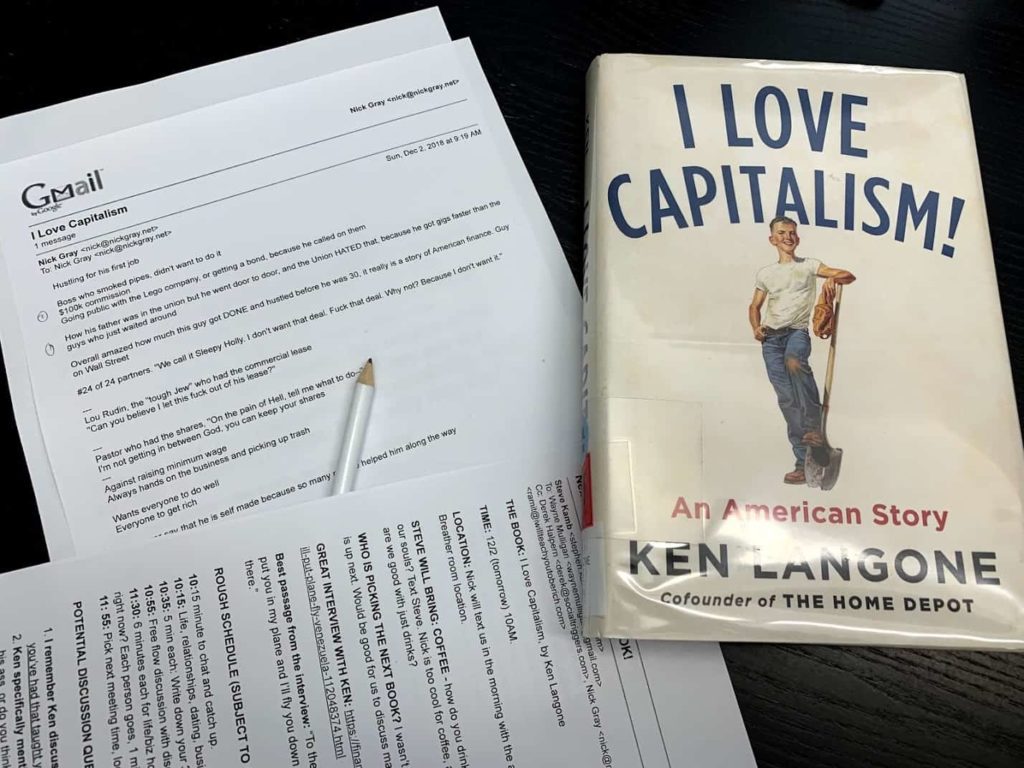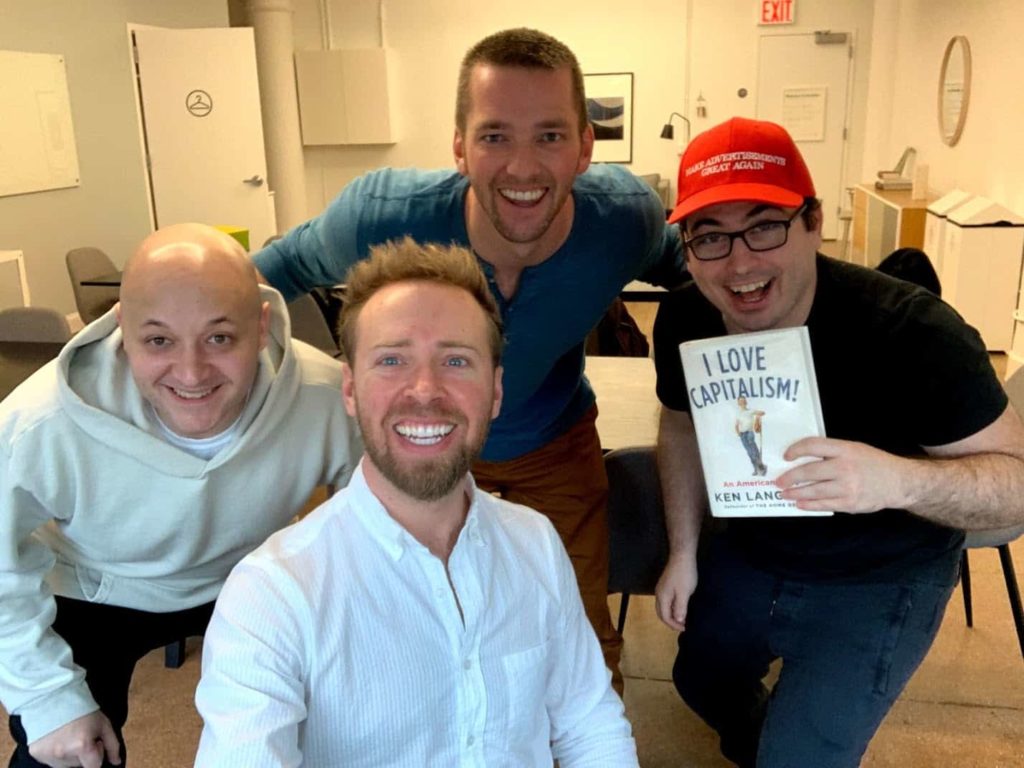Last updated: September 11, 2023
Ken Langone wrote a book called I Love Capitalism. You might think that this is a book mostly about Home Depot.
You would be wrong.
This book is mostly about Ken Langone’s life, coming up on Wall Street, his adventures with the Medical Center at NYU, and a few great chapters on his experience at Home Depot.

Book Club Discussion Questions
Steve Kamb was responsible for running this meeting of our business book club, which occurred on 2 December 2018.
Previously, we had other book club meetings about Netflixed by Gina Keating, Safari by Geoffrey Kent, Losing The Signal, and The Geography of Madness.
Steve did a great job preparing many questions in advance for this book summary, which I’m sharing below:
- I remember Ken discussing some jobs early on that he hated. What was the WORST job you’ve had that taught you the value of a dollar?
- Ken specifically mentions “I’m not a self-made man.” Do you think he’s full of sh!t and covering his ass, or do you think he really believes he’s not self made?
- Ken’s favorite rule in business: underpromise and overdeliver. Where’s an area where you’re overpromising and under delivering in your business right now?
- CEO Bob Nardelli was brought in from GE to run Home Depot. He cut costs to the bone, including cutting cost of Home Depot associates on the floor. Ken: “Bob, they may be a bunch of crybabies to you, but they’re the most precious thing we have,” I said. “They’re the only thing that separates us from everybody else. They’re our secret sauce, our secret weapon. They’re what make us what we are as a company.” Tough because those intangibles don’t show up on the balance sheet. And Ken is a numbers/$$ guy. What are your intangibles that don’t show up on the balance sheet?
- Ken waited too long to fire Bob Nardelli: “As with Steve Sato at IVAC, Bob was a great leader until he wasn’t. Was I too slow in both cases to see the writing on the wall? Definitely. Both guys were racking up great numbers but ignoring the human equation, and in business good numbers can be like sunlight: blindingly bright.” What’s something you’re avoiding dealing with right now?
- The name of the book is “I Love Capitalism!” I feel like this in direct response to the rise of Democratic Socialism amongst young people. Ken has F- You money and can take these stands right now. How do you deal with employees or people that don’t agree that capitalism is the best system we have?
- How much is “F-ck You” money to you? What’s the actual dollar amount? If somebody offered to take your company off your hands for that amount, would you take it? What does F-ck You Money get you?
- Ken made massive donations to NYU Medical, Bucknell University, NYU night business school, etc. He just pledged $100 million towards making tuition free for NYU medical students. What’s a cause that’s important to you that’d once you make FU money, you can make a reality?
Group Photo

My Notes from I Love Capitalism
Assorted notes I jotted down:
Hustling for his first job
Boss who smoked pipes, didn’t want to do it
$100k commission
Going public with the Lego company, or getting a bond, because he called on them
How his father was in the union but he went door to door, and the Union HATED that, because he got gigs faster than the guys who just waited around
Overall amazed how much this guy got DONE and hustled before he was 30, it really is a story of American finance / guy on Wall Street
#24 of 24 partners. “We call it Sleepy Holly. I don’t want that deal. Fuck that deal. Why not? Because I don’t want it.”
Lou Rudin, the “tough Jew” who had the commercial lease: “Can you believe I let this fuck out of his lease?”
Pastor who had the shares, “On the pain of Hell, tell me what to do–“
Ken says, “Father, I’m not getting in between God, you can keep your shares.”
Against raising minimum wage.
Always hands on the business and picking up trash
Wants everyone to do well. Everyone to get rich.
Will never say that he is self made because so many people helped him along the way.
So many great Ross Perot stories. The Stan Druckenmiller story also funny.
“Were you guys born stupid, or did you just turn that way?”
My thoughts
While Ken Langone’s journey in the world of finance and his ventures like Home Depot are impressive, what sets him apart is his perspective on capitalism itself. Unlike many, he emphasizes the significance of human elements in business. This focus on the ‘human equation’, as mentioned in the blog, reminds readers of the values of Andrew Carnegie, who not only amassed immense wealth but also believed in giving back to society. Carnegie’s philanthropic endeavors set an example that many billionaires, including Langone, have sought to emulate.
One of the primary takeaways from the book is the essence of true capitalism. Capitalism isn’t just about amassing wealth; it’s about creating value. Langone’s stories, like the one where he is hands-on in his business and always picking up trash, emphasize the core principle of value creation. Every act, big or small, contributes to the larger goal of enhancing value – both for the stakeholders and for the community.
Another salient point that stands out from Langone’s narrative is the role of mentorship and gratitude. He repeatedly states that he never considers himself self-made. This sentiment resonates deeply with many entrepreneurs who acknowledge the invaluable role of guidance and mentorship in their journeys. It’s a stark contrast to the traditional image of the “lone wolf” entrepreneur, and it’s a refreshing perspective in today’s business landscape.
Langone’s pledge of $100 million towards making tuition free for NYU medical students isn’t just a generous act; it underscores a capitalist’s responsibility towards society. The notion isn’t new. Philanthropists like Bill Gates and Warren Buffet have long vouched for the idea that with great wealth comes great responsibility. Langone’s acts of generosity are a testament to this philosophy, reinforcing the idea that true capitalists don’t just hoard wealth but use it for the greater good.
While Langone’s love for capitalism is evident, the book also prompts readers to reflect upon the evolution of this economic system. With increasing discussions around sustainable and conscious capitalism, business leaders need to adapt to the changing dynamics. Langone’s stories provide a foundation upon which one can contemplate the future trajectory of capitalism. How can modern entrepreneurs uphold the values of true capitalism while navigating the complexities of the modern business world?
Conclusion
There aren’t a lot of notes here because I listened to it as an audiobook, and I was late in typing up these notes.
But I really liked the book. I especially liked the Ross Perot anecdotes, such as driving through the tunnel to sign the stock sale documents in New Jersey and how Ken played a trick on Ross in the back of the limo.
He reminded me, in a sense, of Sam Walton and the book: Sam Walton: The Inside Story.
For more information check the interview with Ken Langone below
Other books we’ve read in our business book club:
